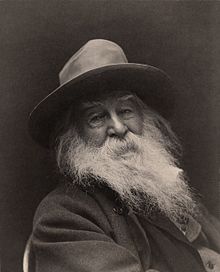When I Heard the Learn’d Astronomer
When I heard the learn’d astronomer,
When the proofs, the figures, were ranged in columns before me,
When I was shown the charts and diagrams, to add, divide, and
measure them,
When I sitting heard the astronomer where he lectured with much
applause in the lecture-room,
How soon unaccountable I became tired and sick,
Till rising and gliding out I wander’d off by myself,
In the mystical moist night-air, and from time to time,
Look’d up in perfect silence at the stars.
When the proofs, the figures, were ranged in columns before me,
When I was shown the charts and diagrams, to add, divide, and
measure them,
When I sitting heard the astronomer where he lectured with much
applause in the lecture-room,
How soon unaccountable I became tired and sick,
Till rising and gliding out I wander’d off by myself,
In the mystical moist night-air, and from time to time,
Look’d up in perfect silence at the stars.
I prefer simple poems. Poetry written in the vein, for example, of Whitman's "When I Heard the Learn'd Astronomer." I understood this poem the first time I read it. In that regard, it is a simple poem. There is no vagueness about it, there is no confusion as to what is going on. There is no need for a hundred readings before you “figure it out.” It is, however, deceptively simple. I know this because I keep coming back to it. I discover new things. The message of the poem is essentially the same, yet the reasons for why that message is communicated so powerfully are slowly revealed through multiple readings over the years. In addition, the force with which the message is communicated is so effective that additional readings do not fail to give pleasure. In these regards the poem is a complicated poem, but its complexity informs and strengthens the poem's message rather than muddles or interferes with it.
"When I Heard the Learn'd Astronomer" confirms my own bent. It reminds me to appreciate my own writing. Too often I find, especially in modern poetry, that there is a barrage of similes and metaphors that distort and complicate a poem’s beauty and message. There is a hail of imagery that baffle and confuse rather than clarify and strengthen. In short, I am less patient with poetry than in years past. Every poem deserves multiple readings, but when I simple do not understand a poem’s message or beauty, I am more apt to place the blame on vague, sloppy, and clashing writing rather than on any deficiency of appreciation, perception, or understanding on my part. I prefer simple poems.
"When I Heard the Learn'd Astronomer" confirms my own bent. It reminds me to appreciate my own writing. Too often I find, especially in modern poetry, that there is a barrage of similes and metaphors that distort and complicate a poem’s beauty and message. There is a hail of imagery that baffle and confuse rather than clarify and strengthen. In short, I am less patient with poetry than in years past. Every poem deserves multiple readings, but when I simple do not understand a poem’s message or beauty, I am more apt to place the blame on vague, sloppy, and clashing writing rather than on any deficiency of appreciation, perception, or understanding on my part. I prefer simple poems.
